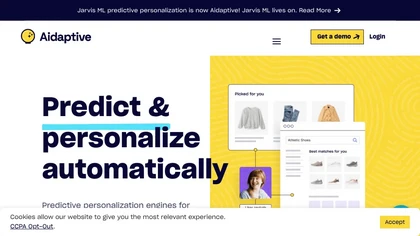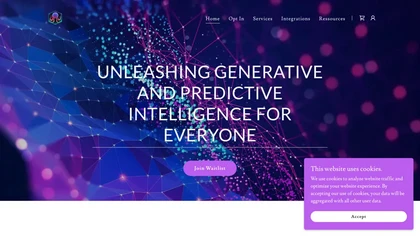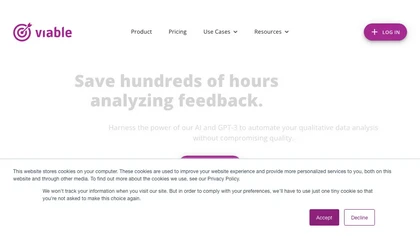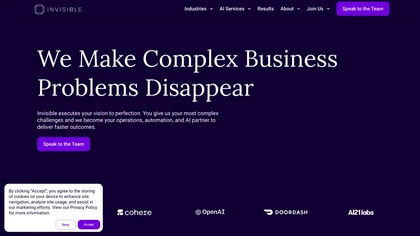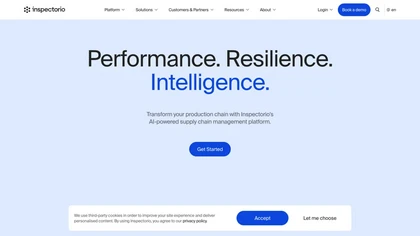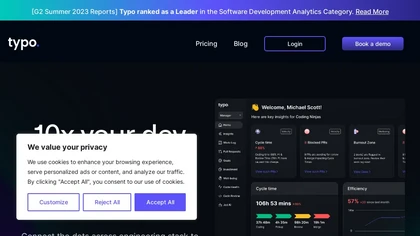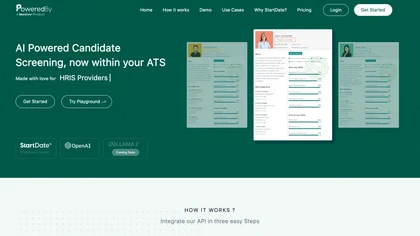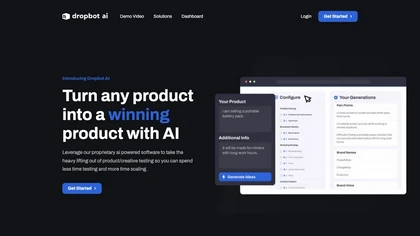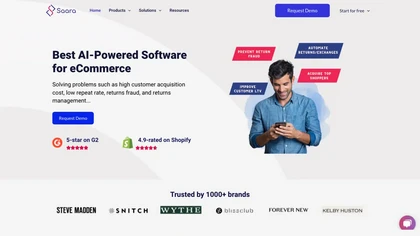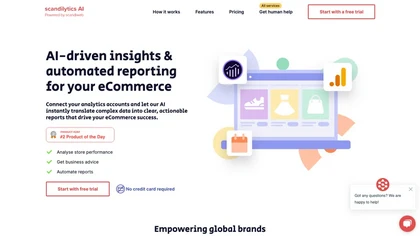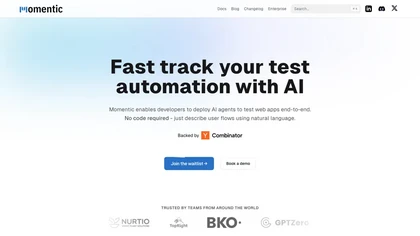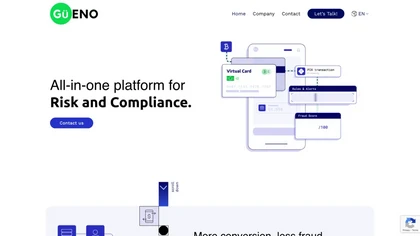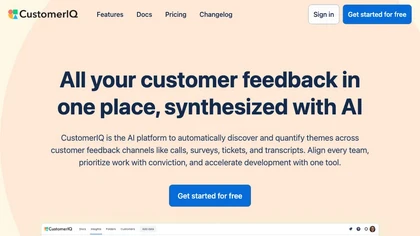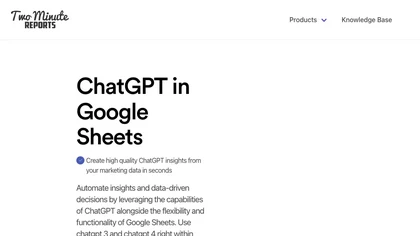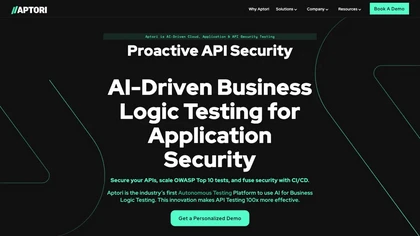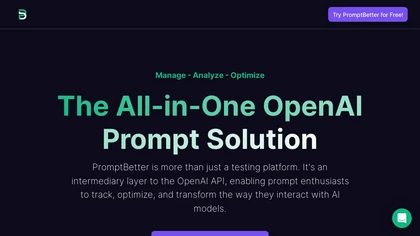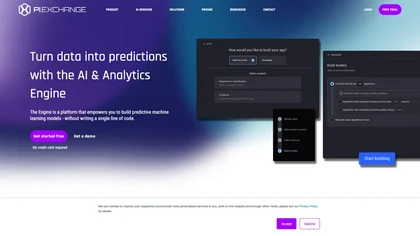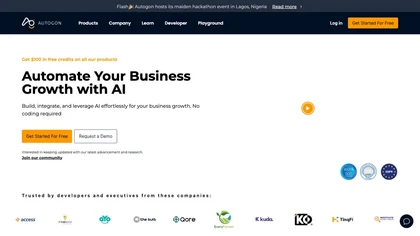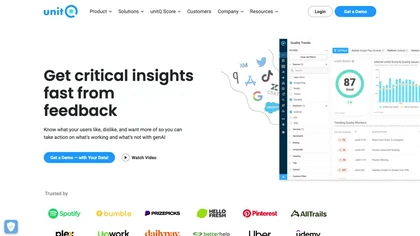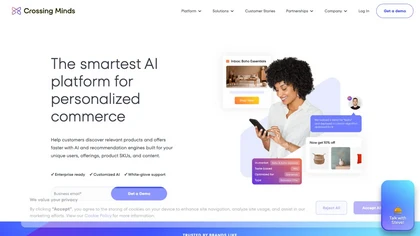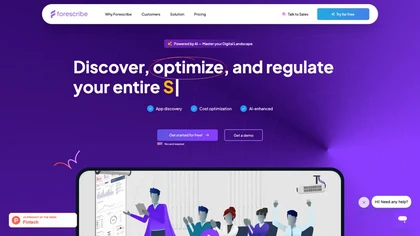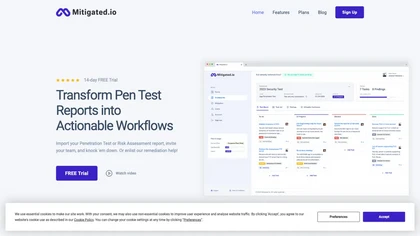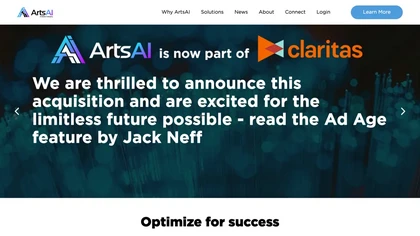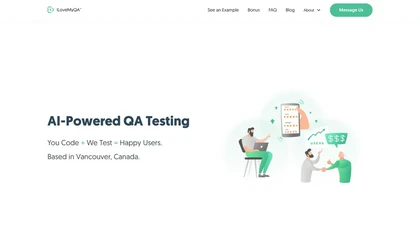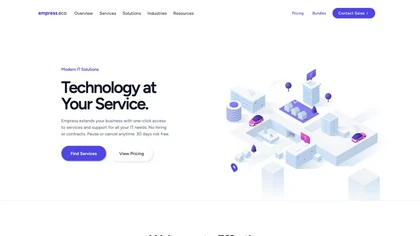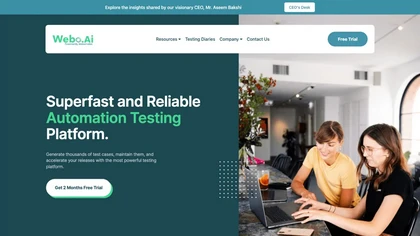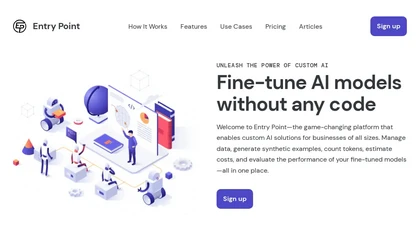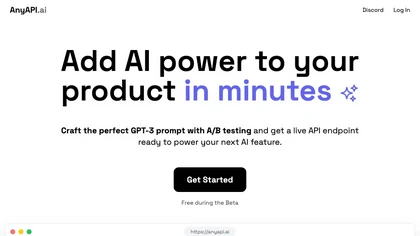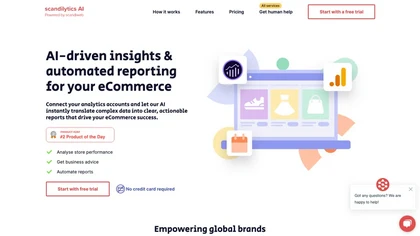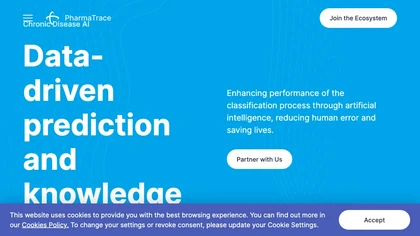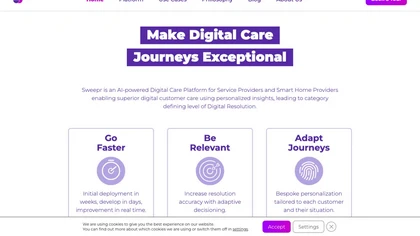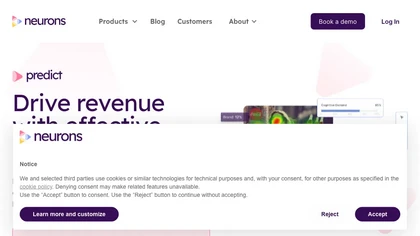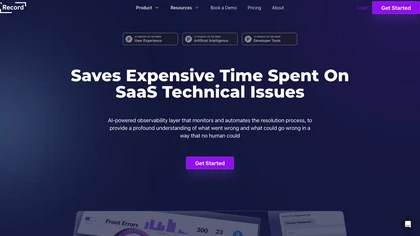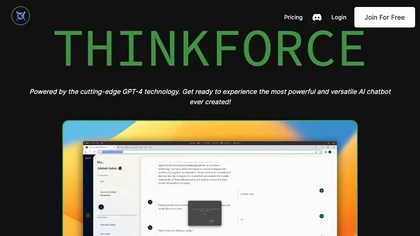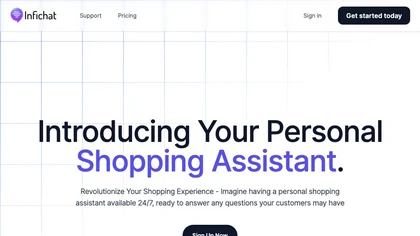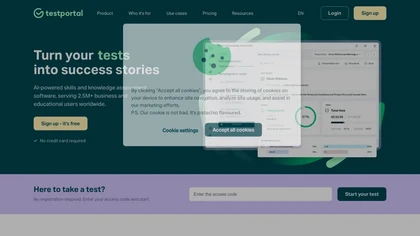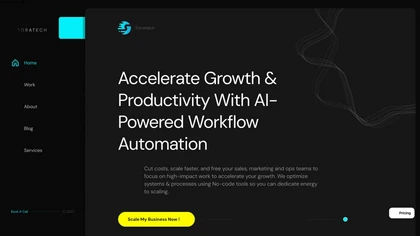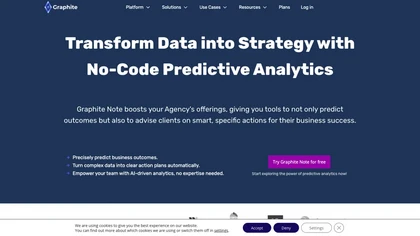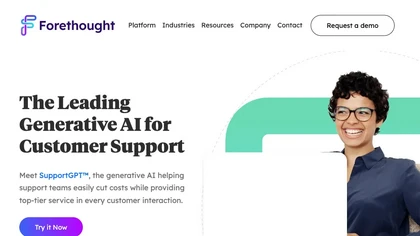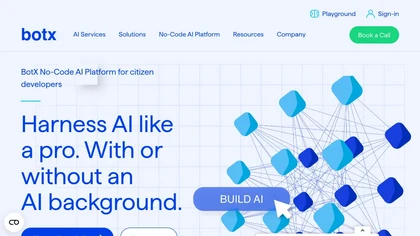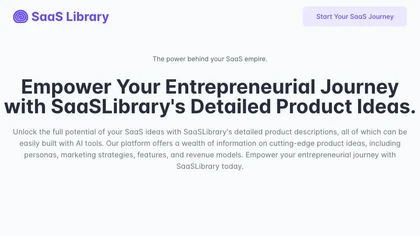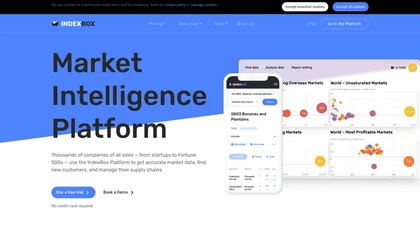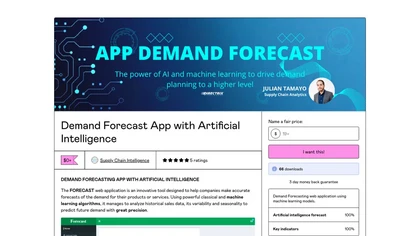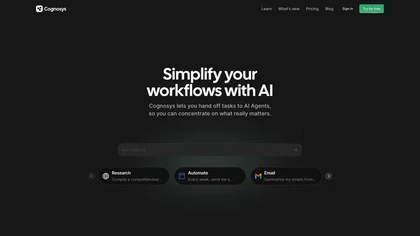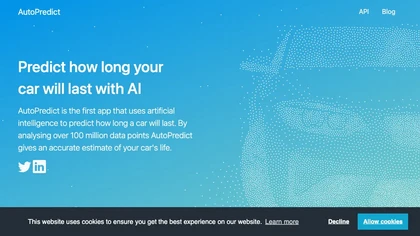AI use cases for Technology Integration
Generative AI can be applied in various applications for technology integration. Here are some examples to explore below for inspiration with AI tools to get you started with using AI in technology integration.
🛠️ 70 AI tools for Technology Integration
Explore a dynamic list of some of the most popular tools to get you started with various AI use cases and applications for Technology Integration to streamline your workflows and productivity today.
Aidaptive features
- Recommendations
- Pricing
- Search
- Merchandising
Predict Expert AI features
- Crafting unique AI models
- Integrating intelligent applications and APIs
- Tailoring AI models and applications to address specific business needs
- Real-time operational insights
- Monitoring performance in real-time
Reform features
- Modular building blocks for customized solutions
- State-of-the-art multimodal AI models for logistics documentation
- Automation of data capture for various documents
- Seamless integration with universal transportation management systems (TMS) through a universal API
- Embeddable customer dashboards for real-time data insights
SeniorDev features
- Automated codebase debt analysis
- 24/7 monitoring
- AI-powered automated test generation
- Automated documentation generation
- 3-step integration process
viable features
- Automated qualitative data analysis
- Customer feedback understanding
- Nlp technology
- Feedback analysis
Datatruck features
- Automating manual processes
- Providing reporting analytics
- Offering actionable insights through AI/ML analytics
- Hyper automation capabilities
- Seamless data integration and real-time visibility
ConsumerAI features
- Product recommendation
- Ai based
- Question
- Problem solving
🔥
Create your account, save tools & get personal recommendations
Receive a weekly digest of our handpicked top tools.
Unsubscribe anytime
Invisible Technologies Inc. features
- Wide array of operational needs tackling
- Real-time flexibility and integration with existing systems
- Achieving 8x ROI within 30 days for SKU enrichment
- GPT-4 integration
- Tailored AI solutions for multiple industries
Glass features
- Omnichannel customer relationship automation
- Integration with various platforms like WhatsApp, chat APIs, Instagram, and QR codes
- Virtual business analyst capabilities
- AI-powered chatbots for 24/7 support and personalized engagements
- Predictive analytics for better product optimization
Potions features
- Personalized product recommendations
- Smart sorting of list pages
- Cookie-free personalization technology
- Seamless integration
- Real-time performance monitoring
Testmarket Analytics INC features
- Keyword analysis for product listing optimization
- Multi-platform sales-boosting services
- Google ads management
- Advertising optimization services
- Campaign creation support
inspectorio.com features
- AI-powered supply chain management platform
- Utilization of innovative technologies like AI
- Digitizes and connects supply chain processes within a single tool
- Enables intelligent analysis of the entire ecosystem
- Reduces production chain risks through advanced analytics
Typo features
- Measure effort and cost spent on innovation
- Technical debt
- Roadmap
- Identify sdlc metrics that impact development efficiency
- Remove blockers in real-time
GeniePM features
- Product requirements
- User stories
- Use cases
PoweredBy features
- Integration with ATS and HRIS providers
- API key generation for screening requests
- Utilizes proprietary model for job analysis
- Includes NLP and computer vision applications
- Proficiency in machine learning frameworks
DropbotAI features
- Streamline product testing process for dropshipping businesses
- Simplify product and creative testing with proprietary AI technology
- Provide winning ideas and angles to enhance marketing strategies
- Generate over 20 outputs including marketing strategies and ad campaigns
- Intuitive dashboard and quick output generation for efficiency
Saara.io features
- Focus on solving common industry challenges
- Reduce operational costs
- Analyzing customer data for personalized offers and improved shopping experience
Scandilytics features
- Advanced analytics for store performance insights
- Business advice based on data analysis
- Automated reporting processes
- Connection with analytics accounts for data translation
- AI-based trend analysis and opportunity identification
Screenwriter features
- Web test automation
- AI agents deployment for end-to-end testing
- User flows description using natural language
- Comparison of browser automation frameworks
- Test creation and debugging without codebase access
AI-FraudGuard Ecommerce features
- Contactless conversion
- Fraud prevention
- Transaction monitoring
- Compliance processes automation
- Real-time monitoring
ContextQA 2.0 features
- UI Testing
- Mobile Testing
- API Testing
- Cross Browser Testing
- Accessibility Testing
Bara Platform features
- Advanced artificial intelligence tool
- In-depth analytics and predictive insights
- Cutting-edge algorithms and machine learning capabilities
- Intuitive dashboard for visualizing complex data sets
- Actionable insights for strategic decision-making
Devzery features
- Automate API regression testing
- Catch regressions early
- AI-driven test executions without duplication
- Integrated with CI/CD pipelines
- Thorough testing coverage
CustomerIQ features
- Aggregate feedback from various channels
- Powerful analytics for customer feedback
- Chat with data
- Automated segmentation and tagging
- Multiple integrations available
Teste.ai features
- Comprehensive test scenario and case creation
- Wide range of test scenario generation
- AI-powered test planning and execution
- Automatic test case generation based on documentation
- Seamless collaboration through sharing of test plans and results
ChatGPT in Google Sheets features
- 1
- 2
- 3
- 4
- 5
Aptori features
- API security testing
- Business logic testing
- Semantic reasoning technology
- AI-driven test automation
- Continuous risk assessment
Intellimize features
- Personalized marketing
- Website optimization
- Machine learning
- Conversion acceleration
- Faster results
PromptBetter features
- A/b testing
- Real-time feedback
- Prompt management
- Openai api integration
- Performance monitoring
Pi Exchange features
- End-to-end machine-learning tool
- Eliminates the need for coding
- Smart data preparation
- Model development
- Deployment functionalities
RapidAI features
- Customized AI tools
- Streamline operations
- Reduce costs
- Range of powerful AI tools
- Optimize work
Autogon AI features
- No-code AI infrastructure
- Tools for vision AI, predictive modeling, and data generation
- Custom model development with LinguaFlow
- ChatBot for engaging conversations
- Marketplace for buying and selling AI projects without coding
unitQ GPT features
- Aggregates feedback from various sources
- Automates categorization of feedback
- Evaluates sentiment of feedback
- Delivers actionable insights without manual effort
- Detects urgent issues sooner
crossingminds.com features
- Data enrichment with intuitive tags and properties
- Personalized product recommendations for various industries
- Behavior-based approach to recommendations
- Seamless integration with existing tech stacks
- Driving cross-selling and upselling opportunities
Shown features
- Automated ad targeting
- Automated copywriting
- Ad creatives creation
- 24/7 ad optimization
- Campaign performance monitoring
Forescribe features
- Discover, analyze, and manage integrations of SaaS applications
- Provide real-time insights on SaaS usage and compliance
- Automated compliance checks for SaaS applications
- Offer cost optimization suggestions for SaaS applications
- Enhance transparency in digital landscape governance
Mitigated.io features
- Transforms penetration test risk assessment reports into actionable workflows
- Leverages collaborative workspaces for task assignment and progress tracking
- Provides AI-enriched mitigation guidance for security vulnerabilities
- Supports easy import of assessment reports
- Enables users to enlist security mitigation services directly from the dashboard
adxcel.com features
- Adaptive marketing automation
- Cross-channel attribution
- Predictive personalization
- Comprehensive attribution reporting
- AI Boost feature
ilovemyqa.com features
- AI-powered QA testing
- Real device testing on various platforms
- Identification of critical and annoying bugs
- Enhancing overall quality and user experience
- Cost and management efficiency
empress.eco features
- AI-powered automation
- On-demand outsourcing solutions
- Software integrations
- Helpdesk services
- Industry-specific solutions
Webo.AI features
- Test case generation
- Test case maintenance
- Release cycle acceleration
- Test time reduction
- Defect reduction
Unfig features
- Automated data capture from various logistics documents
- Universal TMS integrations for seamless connectivity
- Embeddable customer dashboards for real-time data insights
- Scraping information from numerous sources for visibility into logistics data
- Streamlining logistics operations with unprecedented speed and efficiency
Entry Point features
- Import data
- Organize data
- Write prompt/completion templates
- View counts and tokens
- Check model performance
AnyAPI features
- Gpt-3 prompt crafting
- A/b testing
- Api access
- Email task automation
- Json generation from gpt-3
Faraday features
- Predicting customer behavior
- Assessing customer potential
- Providing personalized recommendations
- Identifying at-risk customers
- Optimizing marketing campaigns
idPOD features
- Data integration and analysis
- Integration of multiple data sources
- Advanced algorithms
- Customizable features
- Improving decision-making
secretsaucepartners.com features
- Fit Predictor
- Style Finder
- Outfit Maker
- Seamless integration
- A/B testing
LatenceTech features
- Real-time monitoring
- Prediction of network issues
- In-depth analysis
- Cloud-based analytics platform
- Utilizes machine learning and artificial intelligence
Data Analyst AI features
- Data Analyst AI
- Automated reporting
- Tailored marketing strategies
- Streamlined marketing efforts
- Secure data processing
PharmaTrace features
- Chronic disease management
- Early disease detection
- Economic costs reduction
- Budget forecasting
- Decision support
sweepr.com features
- Personalized insights for digital customer care
- Adaptive decision-making
- Bespoke personalization
- Omnichannel support
- Generative AI capabilities
Predict features
- Predict human behavior
- Optimize creatives
- Increase conversions
- Improve user engagement
- Unlimited pre-testing and benchmarking
Breadcrumbs Copilot features
Record features
- Automated issue resolution process
- Monitoring user sessions
- Capture necessary data automatically
- AI suggestions for issue resolution
- Integration with support systems like Zendesk and Slack
Thinkforce features
- Upload data
- Integrate with apps
- Chat with knowledge base
- Train on your data
- Generate innovative suggestions
Dairytech.ai features
- milkround automation
- automatic payment collection
- stock reconciliation
- online order management
- customer communication
Infichat features
- Instant product discovery
- Personalized recommendations
- Seamless customer support
- Maximize conversion rates
testportal.net features
- AI question generator
- Detailed reporting options
- Insights and analytics for real-time inputs
- Support for integrations and APIs
- Automated feedback and grading
Soratech features
- AI-powered workflow automation
- No-code tools utilization
- Access to top-tier experts
- Fixed monthly subscription model
- Focus on automation solutions for various business functions
Graphite Note features
- Predict outcomes
- Recommend smart actions
- Analyze customer behavior patterns
- Personalize marketing strategies
- Optimize inventory
Forethought features
- Automate customer support
- Lower support costs
- Provide top-tier service
- Efficient customer interactions
Autonoma features
- Create a new account
- Connect with your code
- Let AI do the rest
- Understand visually, from start to finish
- Spot code upgrades
Botx features
- Create
- Automate
- Build
- Pro
- Start
- Machine learning
- Deep learning
- Natural language processing
- Computer vision
Feedback by AI features
- Idea testing
- Real-time feedback
- Demand identification
- Risk reduction
- Audience needs adaptation
SaaS Library features
- Product idea generation
- Market strategy development
- Revenue model analysis
- Persona insights
IndexBox
5IndexBox features
- Access to accurate market data
- User-friendly interface for quick generation of market reports
- Predictive modeling for forecasting market trends
- Machine learning capabilities
- Data integrity through cross-checking from multiple sources
Demand Forecast features
- Utilizes classical machine learning algorithms
- Allows uploading data sets from Excel
- Automatically selects the best model for each product
- Provides clear visualizations and interactive graphs for demand predictions
- Includes features like historical data analysis, outlier detection, model competition algorithms, and KPI forecast systems
Cognosys features
- Automating tasks through AI agents
- Conducting in-depth market analysis
- Examining consumer preferences
- Identifying regulatory challenges
- Analyzing key industry players within specific sectors
AutoPredict features
- Predicting car lifespan
- Analyzing millions of data points
- Generating accurate predictions and statistics
- Offering an api for businesses
- Providing insights and statistics on its blog
Insightful features
- Provide personalized on-demand coaching
- Focus on specific needs
- Available anytime, anywhere
- Blog with latest insights on living a fulfilling life
- Accountability coaching to help young professionals reach full potential
